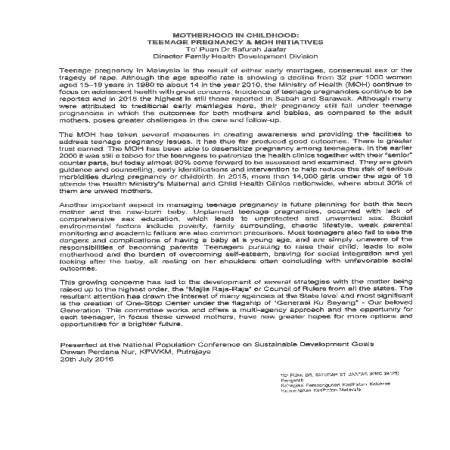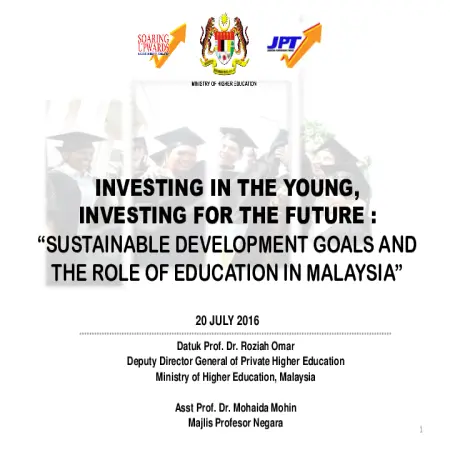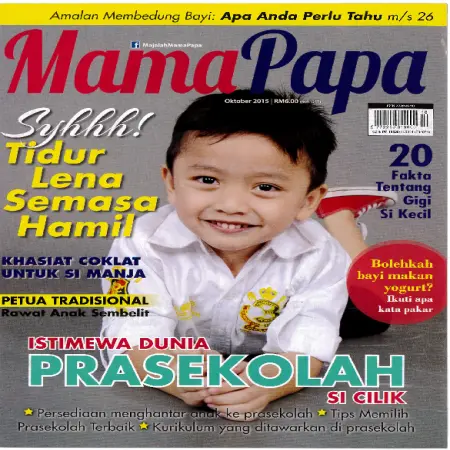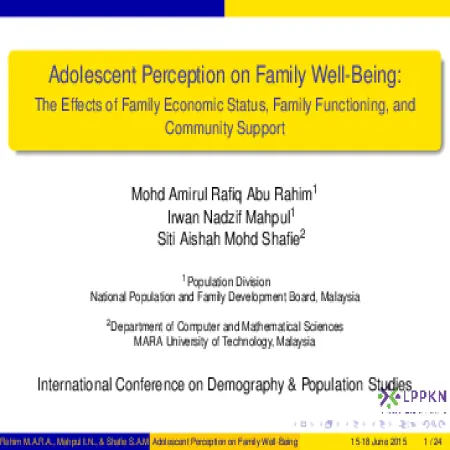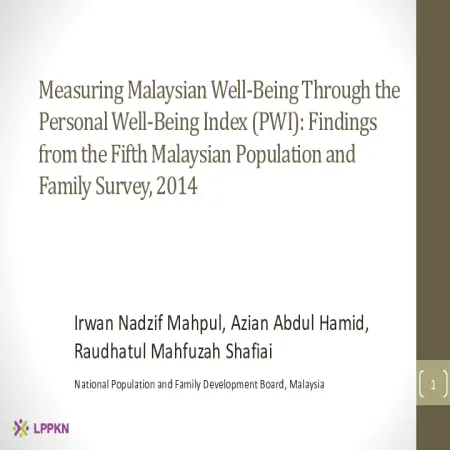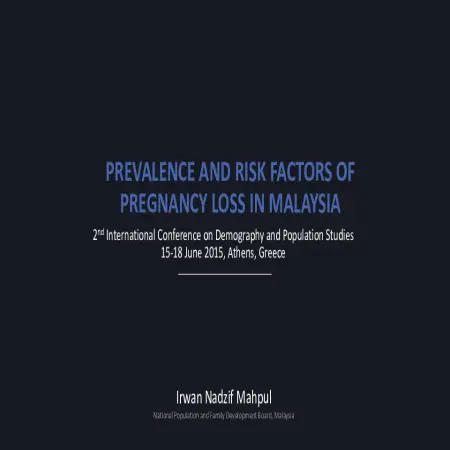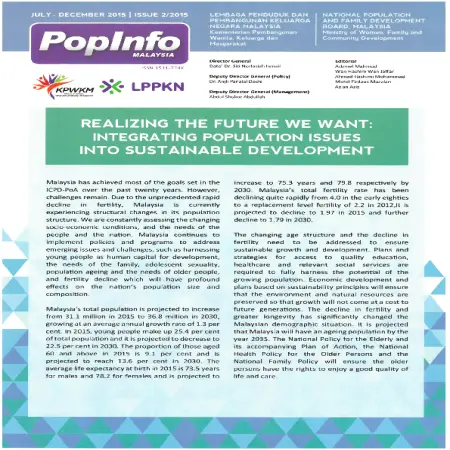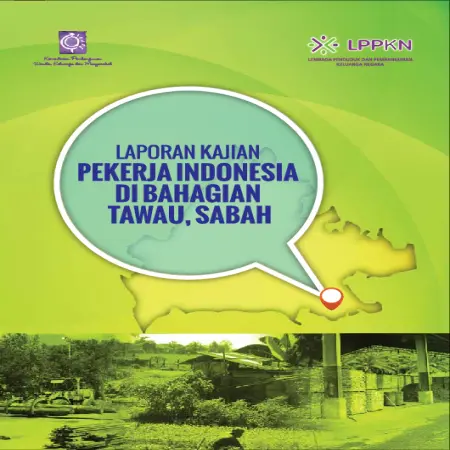Browse by Subject
Results for Search : "303 Social processes"
|
|
The 49th session of the Commission on Population and Development on agenda item 4: general debate on national experience in population matters: "strengthening the demographic evidence base for the post - 2015 development agenda", New York
Item Type: Country Statement
Editor:
Year: 00/00/2016
Abstract: The Department of Statistics Malaysia (DOSM) has been responsible for undertaking the Population and Housing Censuses of Malaysia every years since 1970. The Census remains the main source of data collection aimed at providing a comprehensive set of statistical
information about the population in the country in terms of its size and spatial distribution, its demographic, social and economic characteristics as well as housing stock at a specific time
reference. The census provides essential information not only for policy development and planning, but also for managing, monitoring and evaluating programs and activities across a broad spectrum of sectors. The 2010 Census round utilized improved ICT technologies and new approaches in the different phases of the census operation. The emerging technologies are transforming the way the Census is conducted in terms of operations management, quality assurance, data capture, mapping (GIS, GPS), data processing and storage. With the ever increasing individual privacy and accessibility of internet, the e-Census was introduced in 2010. An internet based questionnaire for data collection, was found to be more effective to capture respondents mainly in large urban areas and the gated communities.
|
|
|
|
|
|
Motherhood in childhood: teenage pregnancy & MOH initiatives
Item Type: Conference or Workshop Item
Editor:
Year: 00/00/2016
Abstract: Teenage pregnancy in Malaysia is the result of either early marriages, consensual sex or the tragedy of rape. Although the age specific rate is showing a decline from 32 per 1000 women aged 1-19 years in 1980 to about 14 in the year 2010, the Ministry of Health (MOH) continue to focus on adolescent health with great concerns. Incidence of teenage pregnancies continue to be reported and in 2015 the highest is still those reported in Sabah dan Sarawak. The MOH has taken several measures in creating awareness and providing the facilities to address teenage pregnancy issues. They are given guidance and counselling, early identifications and intervention to help reduce the risk of serious morbidities during pregnancy or childbirth. This presentation discusses about teenage pregnancy problem in Malaysia.
|
|
|
|
|
|
Investing in young people: matching education with employment needs
Item Type: Conference or Workshop Item
Editor:
Year: 00/00/2016
Abstract: Education has always been the engine of growth for Malaysia. Malaysia aspiration to become a high income nation by 2020. Multi-prong strategies which include access to education for all among the pillars to transforming the nation. Malaysia has always been embracing with the strategies and action plans of the sustainable development goals regardless of class, race, gender, age and creed.
|
|
|
|
|
|
Ikat anak: siksa atau keselamatan
Item Type: Article
Editor:
Year: 10/11/2015
Abstract: The average trend in Asia, especially in Malaysia, parents prefer to hold or support the baby on the grounds that it is easier to monitor, breastfeed and put them to sleep. Many parents seem to assume that sitting on their lap is enough to protect their baby from accidents and upset to see a toddler lying tied up in a car seat. Based on statistics, the use of child safety seats and travel systems is not taken seriously by most parents in Malaysia. According to a study conducted by MIROS, babies will be thrown forward at high speeds even if held by an adult during a vehicle collision even with only 30km per hour. Most will be killed as a direct result of the impact.
|
|
|
|
|
|
Antara hak dan tanggungjawab membimbing anak bertanggungjawab
Item Type: Article
Editor:
Year: 00/10/2015
Abstract: Rights can be defined as belonging to each individual while responsibilities are something that must be exercised. Kids who like to take people’s stuff have impulsive traits. Impulsive means someone who has a strong urge to have something. When the desire peaked, he had to get it right away. Some tips are shared to parents when faced with this situation such as encouraging children to ask permission every time they want to borrow items that do not belong to them, explaining to children about the difference between borrowing and taking other people's items without permission and consistent and firm in correcting actions. misconduct of children.
|
|
|
|
|
|
Adolescent perception on family well-being: the effect of family economic status, family functioning, and community support
Item Type: Conference or Workshop Item
Editor:
Year: 00/00/2015
Abstract: The objective of this presentation is to examine the difference of family well-being across several demographic information and to examine the relations between the family well-being in adolescents perceived family economic status, quality of family functioning, and community and neighbourhood support.
|
|
|
|
|
|
Measuring Malaysian well-being through the personal well-being index (PWI): findings from the fifth Malaysian Population and Family Survey, 2014
Item Type: Conference or Workshop Item
Editor:
Year: 00/00/2015
Abstract: The aim of this study is to measure the well-being of Malaysian population through the use of PWI scale developed by the International Wellbeing Group (IWbG). Responses on the PWI scale were collected from over 10,000 adults aged 18 to 59 drawn from a sample of 18,852 living quarters throughout the country. Through the MPFS-5, the Personal Well-Being Index for the Malaysian was recorded at 7.71 out of a maximum score of 10. Out of the eight domains identified, the Spirituality or Religion domain recorded the highest score of 7.56. It then followed by the domain scores of Personal Relationships (7.54), Community-Connectedness (7.52), Personal Safety (7.35), Personal Health (7.10), Future Security (6.96), Standard of Living (6.58) and Achieving in Life (6.56).
|
|
|
|
|
|
Prevalence and risk factors of pregnancy loss in Malaysia
Item Type: Conference or Workshop Item
Editor:
Year: 00/00/2015
Abstract: The objective of this paper is to study the prevalence and risk factors of pregnancy loss in Malaysia. The risk of pregnancy loss is highest among Indian, followed by Malay and Chinese. The risk of pregnancy loss increases with level of education, age at 1st marriage and number of previous non-live births.
|
|
|
|
|
|
Realizing the future we want: integrating population issues into sustainable development
Item Type: Newsletter
Editor:
Year: 00/00/2015
Abstract: Malaysia is closely monitoring the developments and discussion on the post-2015 development agenda. Malaysia believes that the post-2015 development agenda should integrate existing international commitments and outcomes of UN conferences and deliver on equality, social inclusion, decent work, and sustainable livelihoods.
|
|
|
|
|
|
Laporan Kajian Pekerja Indonesia di Bahagian Tawau, Sabah
Item Type: Research Report
Editor:
Year: 00/12/2014
Abstract: In 2009, the National Population and Family Development (NPFDB) has implemented a Strategic Plan Review Second Population (KPSK-2) which takes consider relevant new policies and scenarios demographics and families as well as changes that occurred over a period of a decade and a half let go. One of the components found in this study is concerned with international migration. Results from KPSK-2 and several surveys specifically that has been done in Sabah, found the presence of foreign workers in that amount large in Sabah has resulted in stress to basic social services in particular from the aspect of health and education. In addition that, it also puts pressure as well security and political concerns. Accordingly, in 2010, Ministry of Women, Family and Development The community through NPFDB has run Study of Indonesian Workers in Tawau Division, Sabah to collect information simultaneously from various categories of respondents consisting of Indonesian workers, residents local and employers who use Indonesian employee services. The main objective of the study this is to collect sociodemographic information of Indonesian workers, entry factors, involvement by sector and type of occupation, the impact of admission on the local population and proposed approaches or measures that suitable for employee management and control Indonesia in this country. The fieldwork of the study has taken time for two weeks i.e. from 24 November to 6 December 2010. The location of this study is in the Tawau Division which covers the district Tawau, Kunak and Semporna. For the election sample of Indonesian workers and employers, framework sampling used in the study this is a list of employers who employ Indonesian workers derived from Department of Manpower of Tawau, Kunak and Semporna. Next, the sampling method on a quota basis and comfortably used to select both categories of respondents. Share selection of local population samples, methods comfortable sampling was used given the absence of a sampling frame locals who have employees Indonesia in their community. As a result, information from 896 Indonesian workers, 787 locals and 37 people employers have been successfully collected. Results of interviews conducted against Indonesian workers, found two main factors their migration to Sabah was for looking for more jobs and income height. In addition, migration factors not an economy like strategic geography, the presence of family or relatives and religious and cultural similarities as well affecting their migration here. Results of interviews with locals in turn found most of them to be of the opinion
that the migration of Indonesian workers here is due to the position factor of Tawau which is located adjacent to Indonesia and following in the footsteps of relatives or friends who have or have worked here. Besides, it is also influenced by the unemployment rate high in their country of origin and opportunity more wide open work here.
|
|
|
|






